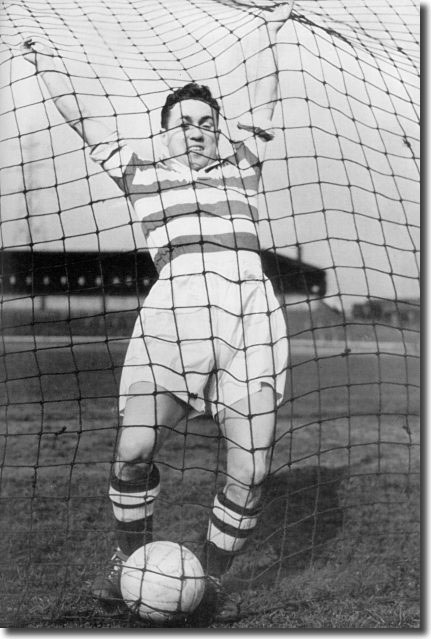 Part
1 An appreciation - Part 3 From Sweden to Liverpool
- Part 4 Back from the dead - Part
5 End of the line
Part
1 An appreciation - Part 3 From Sweden to Liverpool
- Part 4 Back from the dead - Part
5 End of the line
Bobby Collins was one of post-war football's biggest names, bursting
to prominence with Glasgow Celtic in 1949 and becoming one of their favourite
sons. He enjoyed almost a quarter of a century as a professional player,
the first decade of which was in Glasgow, and he achieved legendary status
for his never say die approach.
Born Robert Young Collins in Glasgow on 16 February 1931, he was the
eldest of six children and followed his local club, Third Lanark, as
a boy, often squeezing under the fence to see them play accompanied
by brother Davie.
He was a football fanatic from the very first, recalling later: 'I was
really influenced by players of the era and among a host of Scots we cheered
on were the likes of Jimmy Delaney, Billy Liddell, Archie Macauley, Jimmy
Caskie and two players who went on to manage at the highest level, Bill
Shankly and Matt Busby. England were spoiled for choice and over the years
I saw Eddie Hapgood, Stan Cullis, Joe Mercer, Stan Matthews, Frank Swift,
Raich Carter, Jimmy Hagan and Tommy Lawton display their skills. I played
at every opportunity and growing up I loved hearing about the likes of
Hughie Gallacher, Alex James and Jimmy McMullan who proved that height
did not matter if you are good enough.'
Collins was always on the short side, but never let that deter him,
compensating big style with his football talent and sheer guts. Both
Everton and Celtic chased his signature and the Merseysiders offered
his Pollok club a £1,000 transfer fee. The 17-year-old initially agreed
to the deal, but quickly changed his mind when he heard that Celtic
manager Jimmy McGrory was after him and signed on as a part timer at
Parkhead in 1948 for a weekly wage packet of £8.
The Glasgow giants were among the cream of British football, with 19
Scottish league titles and 15 Scottish Cup wins to their credit since
their formation in 1888. That success was in the past, though, and Celtic
were in a barren spell with only two championships in twenty years, as
arch rivals Rangers eclipsed them, winning the title eleven times over
the same period. Collins may have been joining a footballing super power,
but he did so at one of the lowest points in their history.
Jimmy McGrory had been appointed by club chairman Bob Kelly to bring
back the glory times. He was a Celtic legend in his playing days and
took over from Jimmy McStay in 1945, intent on reviving the club's fortunes.
Bobby Collins was pitched hopefully into this maelstrom of under achievement
as a highly promising 18-year-old. He made his first team debut on 13
August 1949 in a League Cup clash with Rangers. 71,000 Parkhead supporters
saw the youngster perform admirably on the right wing, tormenting Rangers
veteran Jock Shaw.
back to top
Collins: 'I remember going through the middle and Willie Wood fouled
me and we got a penalty. He moaned like hell, but he clipped me. Fortunately,
we won 3-2 and I was never out of the team thereafter. When Celtic played
Rangers you simply had to win and it didn't matter how. If you didn't
win then you knew you wouldn't be able to go out for a while!'
He became an automatic choice, winning rave reviews after his first League
goal, the winner in a 3-2 victory over Hearts. John Jessiman of the Sunday
Express: 'Little Bobby Collins, game as a pebble, built like a Brencarrier,
and in his element at inside-right, crashed home a picture opportunist
goal, fired first time. Away up on the terracing behind the goals, out
flew the green scarves. He brings back to Celtic, this boy, the immortal
fire of Patsy Gallagher. His idea of progress is the shortest way through
… the technique of the electric drill! When he was not hurling himself
at the entire Hearts defence he was back defending. That was Patsy's way.
After the Collins winner, the roar from the Parkhead faithful went on
for five minutes. No wonder!'
He enjoyed a fine debut season, scoring seven League goals, though
Celtic trailed in fifth. Nevertheless it was the club's best finish
since the war. 1951 saw the club slip to a seventh place finish, though
Collins' 15 goals made him top scorer, and included a hat trick in a
6-2 win against East Fife. There was also a first trophy since 1938
as they captured the Scottish Cup. Collins was ever present in the Cup
run, helping the Celts beat Motherwell 1-0 in the final before a 132,000
capacity crowd.
As Collins turned 20, he was making his name as one of the brightest
young stars in Scotland. He recalled later: 'My early games for Celtic
went well and I soon settled into the team's pattern of play … I was expected
to play as a link man in attack as well as a striker who had to get his
share of goals. It was a challenge, but if the manager thought I was capable
of playing in that role then that was fine by me.
'There was no over complication in tactics. Talk never centred on 4-2-4,
4-3-3, diamond formations or sweeper systems, we believed in attacking
football. That was our style of play. If we were on the attack we'd have
five forwards and two wing-halves looking for opportunities and supporting
each other. If we were on the defensive we'd track back to support our
defenders.
'Of course, we had players who could control a game; intelligent footballers
like Bobby Evans, Willie Fernie, Charlie Tully and John McPhail, and with
players of this calibre in the side changing tactics came natural to us
and we were able to adapt. If we had to battle we could and if we were
able to play our natural game we did.'
Collins' outstanding club form caught the eye of the Scotland selectors
and he was called up to the full international squad in the autumn of
1950. Injury forced his withdrawal from a fixture with Switzerland,
but he made his full debut soon afterwards, at Cardiff against Wales
on 21 October 1950. Bobby laid on a cross for Billy Liddell to head
home spectacularly en route to a 3-1 victory. Collins retained his place
for home matches with Northern Ireland, a 6-1 triumph with Billy Steel
scoring four, and Austria. The latter game brought a depressing landmark
with a 1-0 defeat leaving the Scots as the first home international
nation to lose on their own turf to overseas opposition. The setback
prompted a radical rebuilding programme, and it was four and a half
years before Collins regained a place.
Despite winning the St Mungo Cup competition in the autumn of 1951 by
beating Aberdeen in a Hampden Park final, Celtic again finished no better
than mid-table in 1952. They had a bunch of outstanding individuals, including
Collins and the mercurial Charlie Tully, but could not function consistently
as a team, trailing in a hugely dispiriting ninth in an up and down campaign.
The season did have a more positive undertone, though, as Celtic welcomed
a new arrival who was to have a fundamental impact on the club, heralding
a revival in their fortunes.
Jock Stein, a gangling defender, was plucked from the obscurity of Llanelli.
He hailed from a fiercely Protestant family and was approaching 30 when
he arrived at Parkhead in December 1951. He was disowned by his Rangers-loving
father and the move created genuine controversy as he crossed Glasgow's
yawning sectarian divide.
Stein had never pulled up any trees, but Celtic scout and reserve team
trainer Jimmy Gribben was convinced enough of his potential to seek him
out when the Celts required defensive reinforcements, as recalled by Archie
MacPherson in his biography of the Big Man:
'It is not entirely clear what had been retained on the retina of Gribben's
mind's 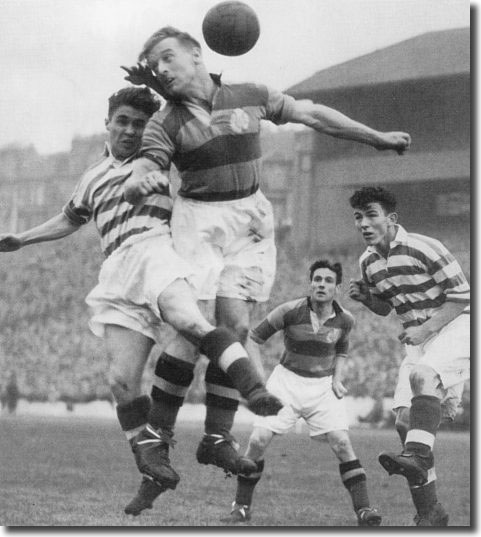 eye
about Stein. Adam McLean, Stein's [Albion] Rovers colleague, has his own
view: "I remember one night we played a reserve game at Celtic Park.
Celtic had fielded [John] McPhail at centre-forward and he was a handful,
as you would know. Well, Jock never gave him a kick at the ball. He out-headed
McPhail, who was good in the air. All right, it was just a reserve game,
but the way Stein played that night he must have caught somebody's eye."
But perhaps even more significant was a game played by Rovers at Celtic
Park in January 1949 when they played for an hour with only ten men. They
were well beaten in the end, 3-0, but it could have been worse and their
defensive performance received wide praise, the Sunday Post identifying
Stein as one of the "heroes". The Sunday Mail noted that
"pivot Stein, along with Muir and English, looked as confident as
if the score had been reversed." That game would possibly have registered
on any football shrewdie like Gribben.
eye
about Stein. Adam McLean, Stein's [Albion] Rovers colleague, has his own
view: "I remember one night we played a reserve game at Celtic Park.
Celtic had fielded [John] McPhail at centre-forward and he was a handful,
as you would know. Well, Jock never gave him a kick at the ball. He out-headed
McPhail, who was good in the air. All right, it was just a reserve game,
but the way Stein played that night he must have caught somebody's eye."
But perhaps even more significant was a game played by Rovers at Celtic
Park in January 1949 when they played for an hour with only ten men. They
were well beaten in the end, 3-0, but it could have been worse and their
defensive performance received wide praise, the Sunday Post identifying
Stein as one of the "heroes". The Sunday Mail noted that
"pivot Stein, along with Muir and English, looked as confident as
if the score had been reversed." That game would possibly have registered
on any football shrewdie like Gribben.
'The news of his December 1951 signing for Celtic was greeted by two
distinct groups of people with almost the same degree of incredulity.
Firstly there were the boys from Burnbank Cross whose sectarian solidarity
was as unflinching as it had always been. They found it hard to comprehend.
Had Stein turned up at the Cross blind drunk and ranting against the evils
of gambling, it would not have caused as great a stir as the news that
he was about to don a green and white jersey. As Harry Steele admitted,
Stein became an outcast. "He lost a lot of pals overnight when he
signed for Celtic. 'Turncoat' was about the kindest thing they said about
him. After a wee while his name just wasn't mentioned at the Cross. And
although he was in and around Burnbank for a long while he never came
back down amongst us to stand and have a blether."
'Then there was the Celtic supporters' reaction. To understand how they
felt you have to understand the state Parkhead was in at that time. Since
the war the club, which enjoyed massive support, had struggled to win
anything … A measure of their inadequacies and the disillusionment of
their supporters came in season 1951/52 when for the first time in 80
years they lost a Scottish Cup replay, on this occasion to Third Lanark
who had beaten them 2-1 at Cathkin. This underlined not only an apparent
lack of ability but the almost spiritless surrender of the only major
trophy they had won in fifteen years, outside the St Mungo Cup. It represented
staggering underachievement for a club that moved whole armies around
the country in its support. Even worse was the fact that they were no
longer the major challengers to Rangers, having been replaced by Hibernian:
since the end of the war the pendulum of success had swung between Ibrox
and Easter Road where the Famous Five Hibs forward line was playing the
kind of football Celtic themselves had always aspired to.
'When Stein joined Celtic, the club had a League record that made their
aficionados wince when they were forced to consider it. They were in twelfth
position in a sixteen-club league with a record of ten points from eleven
matches (three wins, four draws and four defeats). The pain became almost
unbearable, dissent grew thick on the ground, and the supporters wanted
a positive and creative sign from the board that they knew what they were
doing and where they were heading. What they were being informed about
now was that the club had signed a little-known player from a little-known
town in a little-known league in a country that was addicted to a game
where the ball is shaped like an egg. It was not an acquisition likely
to win friends and influence people. If there was incredulity at Burnbank
Cross and its environs, then you might say that on the other side of the
sectarian divide many of the Celtic support were stricken with increased
anxiety and were struggling to make sense of it all.
back to top
'The manager who greeted Stein and was pictured beside him as he signed
on was one of the most self-effacing men in Scottish football, Jimmy McGrory.
His constant geniality, the gentle and polite manner with which he seemed
to exist within the maelstrom of Old Firm politics and his dignified bearing
stood in sharp contrast to the autocratic Kelly. When you met McGrory
inside Celtic Park, nursing his pipe constantly like a life-support system
and invariably greeting you with a broad smile, and didn't know who he
was, you could have mistaken him for some pleasant grandfather who had
been sent in to wait for a ball to be autographed in the dressing room.
According to Sean Fallon, the Celtic captain at that time, McGrory's team
talks hardly evoked the tone of the Gettysburg Address. "It's going
to be a hard game today, lads," was about as much he could summon
up.
'So Kelly was the dominant figure, even when it came to selecting the
team. John McPhail, years after he left Celtic, told me that in those
days there was a specific ritual when it came to away games. "What
would happen when we were away from home is that Bob Kelly and Jimmy McGrory
and maybe another director or two would go into the toilet in the dressing-room
and shut the door. We would all sit around waiting for the team announcement.
Out they would come, and Jimmy would read out the names. That was it.
Just the names read out and then you got on with it. There was one day
when I knew in my bones I wouldn't be playing. It was a cert. I had been
playing badly and I was putting on weight. Well, that day, to my utter
surprise, Jimmy read out my name in the team. I noticed then the chairman
hadn't come out of the toilet and I discovered later that he was answering
the call of nature for he had something wrong with his stomach that day.
The team Jimmy read out wasn't the one they had selected in the toilet.
He made a mistake naming me, and since the chairman wasn't at his elbow
there was nobody there to correct him. I had stripped off like everybody
else and was out on the park before Bob Kelly realised it. Celtic won
that day, by the way, and I got to play because of the chairman's diarrhoea.
I know it sounds incredible now, but that was the way the club was run
in those days."'
Jock Stein's merits were plain enough to Bobby Collins, who offered his
endorsement: 'Some supporters threatened to boycott games if he was selected,
which was incredible. Jock may have been turning professional at the age
of 28, but you had to give him a chance. Fortunately the manager did give
him an opportunity and Jock soon settled into the team.
'Jock read the game well, could spot danger and opportunities quickly
and as a player we all respected him, but it was as a captain that you
really saw his credentials. He was always encouraging and demanding more
effort, and got it. Nobody escaped praise when it was warranted or a sharp
word where necessary.'
Steadied by the influence and leadership of Stein, Celtic won the Coronation
Cup in 1953, defeating Arsenal, Manchester United and Hibs on the way.
Collins' goal direct from a corner was the only score in the game against
the Gunners and he remained one of the club's most regular goalscorers,
despite their inconsistency.
1954 saw Celtic finally recapture both consistency and the championship.
They began the season tentatively, though Collins was on fine form. He
became one of the few players ever to manage a hat trick of penalties
in the same game, helping Celtic beat Aberdeen in September. The Glaswegians
spent most of the season in the wake of table topping Hearts and it seemed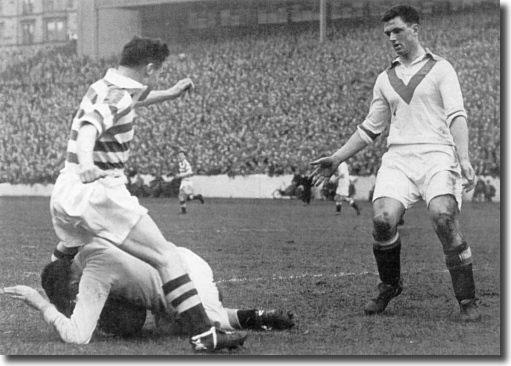 their chance had gone when they lost 3-2 at Tynecastle in February, leaving
the Edinburgh club seven points clear at the top.
their chance had gone when they lost 3-2 at Tynecastle in February, leaving
the Edinburgh club seven points clear at the top.
However, Celtic had become a resolute team under Stein, and they won
their final nine games on the bounce to end the season champions by five
points, securing a first title for 16 years.
Collins played in all but five games, though an injury suffered against
Hearts meant that he missed the Scottish Cup final, which saw his club
secure the Double by beating Aberdeen with a Sean Fallon goal.
Collins: 'It was really disappointing to miss out on the Cup final, but
I was delighted for the lads. I'd been injured for around ten weeks, but
after battling back to fitness I'd hoped to be in contention. It wasn't
to be though, and I couldn't complain because the team had played well
and reached the final without me. I had to wait for my chance to get back
into the first XI. I was just delighted to play and score in the final
League game two days after the Cup final and enjoyed all the celebrations.
Our fans were ecstatic. It was a wonderful achievement because the team
had been in inconsistent form for a number of years so it was fantastic
to put a run together. Overcoming Hearts was a great effort by the squad.'
Celtic failed to defend either trophy in 1955, losing out to Aberdeen
in the title race, though they ended the season with more points than
the year before. They reached the Scottish Cup final but could only draw
1-1 with Clyde.
Archie MacPherson: 'Celtic should have had the Cup won in the first half
hour of the game when they swamped the Clyde defence. Bobby Collins was
demonstrably the most influential player up front, and like all wee men
who perform like that he had the crowd backing him, like a favourite jockey
leading the pack. He was also throwing his small but sturdy frame around
and was particularly heavy on one occasion with Clyde's South African
goalkeeper Hewkins. That was significant for what was to occur later.'
Jimmy Walsh put Celtic ahead after 38 minutes and it was expected that
the goal would be decisive. However, two minutes from time a corner from
Clyde's Archie Robertson was blown into goal by the Hampden swirl and
the Bully Wee had snatched an unlikely draw.
Archie MacPherson: 'What … occurred thereafter was to trigger in Stein's
mind the need for inviolate managerial control over a team. Those next
few days before the replay, particularly the team announcement for the
game just before kick off, preyed on his mind in the days leading up to
his decision to go back to Parkhead as manager in 1965. He never forgot
it … what happened next was a shambles. Collins was dropped. Mochan, who
had scored nine goals in seventeen league matches that season, was kept
in the stand. Walsh's position was changed unaccountably from inside-left
to the right wing. McPhail, who had played centre, was moved to inside-left
and Sean Fallon, famed for his rumbustious style, was brought back after
a long spell of injury to lead the line. The changes were in themselves
odd, but the dropping of Collins in the light of what was to happen was
simply a provocation to the Celtic legions. The wee man had certainly
indulged in uncompromising challenges in the first game and it was clear
that Bob Kelly had taken a dim view of his demeanour, so Collins was not
to play.
'Stein never said an unkind word about Bob Kelly, that I know, but he
as much as admitted to me that he had witnessed manager Jimmy McGrory
being starkly ignored, ridden over and eventually, in terms of the loss
of the replay, ultimately humiliated … Harry Haddock, Clyde's cheery and
mobile full-back captain, read out the Celtic team in the Clyde dressing-room
with astonishment and with a renewed feeling of confidence. It was not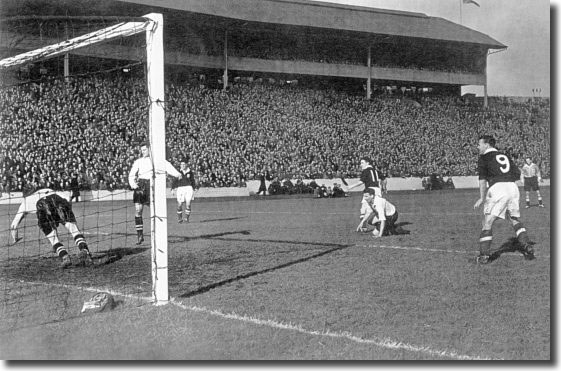 misplaced. On a miserably wet evening, with only 68,831 in attendance
… Tommy Ring scored the only goal for Clyde seven minutes after half-time.'
misplaced. On a miserably wet evening, with only 68,831 in attendance
… Tommy Ring scored the only goal for Clyde seven minutes after half-time.'
Collins was devastated by his exclusion, saying: 'It was really disappointing.
I wonder in the modern game how many chairmen would have taken that decision.
I was not happy.'
back to top
His mood was lifted by a recall to the Scottish ranks as the season drew
to a close.
The Scots had enjoyed a pretty dire couple of years, losing both games
in the 1954 World Cup finals, including a 7-0 reverse against reigning
champions Uruguay. A disastrous 7-2 defeat against England at Wembley
in 1955 had concluded a depressing run of just four victories in 15 games.
The humiliation against the Auld Enemy prompted a major overhaul, with
9 changes for the following match, which brought a 3-0 victory against
Portugal. Collins was recalled for the next game against Yugoslavia in
Belgrade on May 15.
David Saffer: 'In a battling display the Scots twice came from behind
to draw 2-2 and were somewhat unfortunate not to win when they were denied
a last-minute penalty. Four days later national pride was restored after
a thumping 4-1 win in Vienna.
'Played four days after Austria had gained full independence, after concluding
a peace state treaty with wartime occupying powers, the atmosphere was
hostile throughout. Scotland controlled the match for long periods, scoring
in the opening and closing minutes of the game. Clearly frustrated, and
no doubt in mind of the historical importance, home players engaged in
fist fights throughout the game, and twice hundreds of fans invaded the
pitch. The only surprise was that only one Austrian player was sent off,
Barschandt, for persistent fouls on Scotland captain Gordon Smith. Smith
was escorted off the field at the end by police, as was the Scottish team
coach when they left the ground.'
Alec Young of the Scottish Daily Mail: 'This was a great Scottish
victory. No team has been asked to do more and no team had made such a
magnificent response as our lads did in this amazing "Battle of Prater
Stadium". In the midst of all the excitement of this clash it was
a matter of light relief to see Bobby Collins, a lion heart terrier, repeatedly
being pushed aside, yet repeatedly coming back again and even squaring
up to six footers when as often happened football science was forsaken
for the fistic arts.'
Collins retained his place for the final tour match, which the Scots
lost 3-1 to Hungary. Nevertheless, it had been a splendid return for Collins,
who declared: 'It was wonderful to be back and part of a really successful
tour, which gave us tremendous confidence for the battles ahead.'
1955/56 brought more disappointments in the league as Celtic trailed
in fifth behind champions Rangers. They reached the Scottish Cup final
once more, but yet again Collins missed out on the big day, this time
with a knee injury, as Celtic lost 3-1 to Hearts. Collins: 'I could barely
believe it when I was ruled out of a major final for the third year running.
Losing was bad enough, sitting on the sidelines unable to help made it
even more frustrating.'
There was some compensation, though, with two Collins goals helping Celtic
beat Rangers 5-3 in a Hampden replay to win the Glasgow Cup.
Collins sustained a broken leg in a league match against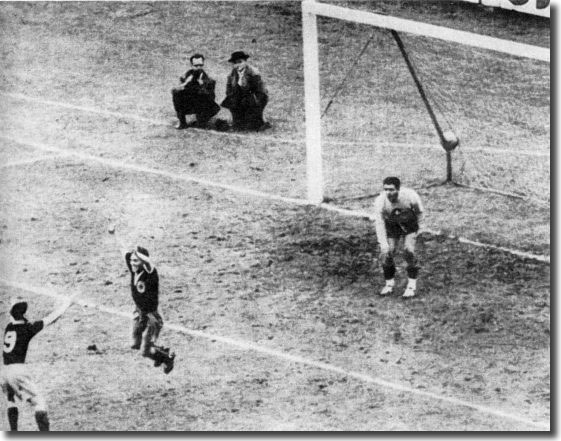 Dundee and missed three months of the 1956-57 season, though he scored
a goal as Celtic beat Partick Thistle 3-0 to win the League Cup.
Dundee and missed three months of the 1956-57 season, though he scored
a goal as Celtic beat Partick Thistle 3-0 to win the League Cup.
He continued to feature for the international team and was a key part
of Scotland's plans for World Cup qualification. Their campaign started
with a clash against Spain at Hampden on 8 May 1957.
The Spaniards had Alfredo Di Stefano in their ranks, but the Scots had
the spirit and the goals of Jackie Mudie, whose hat trick was the telling
factor in a 4-2 triumph. Scotland built on the good start by battling
back from a goal down to win 2-1 in Switzerland. Collins' 72nd minute
decider was his first international goal.
Even better was to come as Bobby contributed a brace when Scotland beat
world champions West Germany 3-1 in a friendly in their own back yard.
Douglas Ritchie: 'Scott and Ring sizzled the ball from wing to wing and
the outside-left turned his final cross low in front of goal. Szymaniak
slipped going to clear and Collins darted in to score. Collins struck
again after 56 minutes. The wee Scot waltzed past a defender and sent
in an atomic shot that almost ripped the roof of the net. The tiny knot
of sore throated Scots in the vast crowd loved that one and even the Germans
couldn't help cheering.'
A 4-1 reverse in the return in Spain was a body blow, but the Scots were
still in pole position and well set for a place in the finals. By beating
the Swiss 3-2 at Hampden in November 1957, Scotland confirmed their place
in the 1958 tournament in Sweden, and Bobby Collins was set to prove his
worth on the biggest stage of all.
He set off for the finals after an outstanding season for Celtic, notching
a career best 19 goals in 30 League games as the Celts finished third,
a distant 16 points behind champions Hearts. The high point came with
an amazing victory over Old Firm rivals Rangers in the Scottish League
Cup final. Bobby sealed the place in the final with a man of the match
performance against Clyde in the semis.
The final was to go down in Celtic folklore as the ultimate humbling
of Rangers. Collins recalls the 7-1 thrashing:
'It was a dream of a game for us, but it must have been a nightmare for
Johnny Valentine. Rangers had signed the big centre-half from Queens Park
at the start of the season but he simply hadn't clicked. On this day at
Hampden, I don't know if Valentine had no faith in George Niven or Niven
had no faith in Valentine, but ultimately they had no faith in themselves,
something you can sense very quickly on a football field, and inevitably
the game became a rout.
'Valentine was covering Billy McPhail and McColl and Davis were covering
Valentine, which left three of our men with the freedom of Hampden. Rangers'
defenders were standing on their heels when Sammy Wilson slammed home
goal number one in 22 minutes. They were standing on their heads when
Neilly Mochan rammed in number two just before half time. They say Rangers'
mistakes in the first half were because of too much sun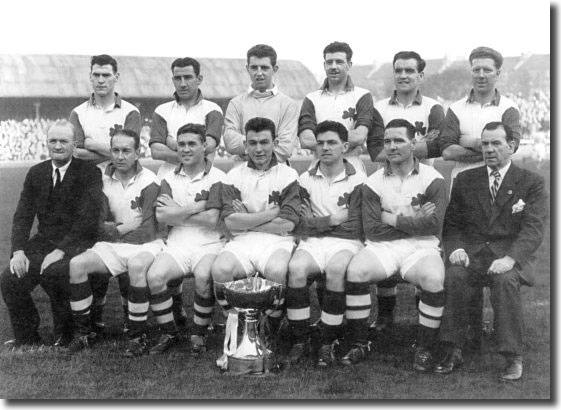 in their eyes, but the truth is there had been too much Celtic in their
eyes!
in their eyes, but the truth is there had been too much Celtic in their
eyes!
'By the time we came out for the second half we had sensed that 'something'
was on. We could scarcely put a foot wrong. The ball sped from toe to
toe. Donnelly to Fernie, Fernie to Tully, Tully to me, over to Mochan
and so on. Just to vary things, the ball often stopped at Willie Fernie.
Willie kept the entertainment going. And every now and then we slotted
in another goal.
'Billy McPhail took a joint gift from Niven and Valentine to make it
three. A good flying header by Billy Simpson reduced our lead, but somehow
it didn't seem to matter. We just carried on, playing our football and
we scored another four.
'Twice I hit the bar with 30-yard free kicks. McPhail nodded in to make
it 4-1. Neilly Mochan duffed a kick, yet still saw his shot enter the
net. Billy McPhail stepped in to complete his hat trick, then with the
last kick of the game, Willie Fernie got his own souvenir of the occasion.
Shearer fouled McPhail … penalty! Fernie took the kick. The ball landed
low in the net. The time up whistle blew.
'It was the biggest ever victory to be chalked up in a competitive Old
Firm game and as a special favour, the Celtic players were allowed to
keep their jerseys as a souvenir of the great day.'
It was a truly memorable occasion for Celtic and Bobby Collins and the
perfect springboard for his footballing summer.
Part 1 An appreciation - Part
3 From Sweden to Liverpool - Part 4 Back from
the dead - Part 5 End of the line
back to top











 Part
1 An appreciation - Part 3 From Sweden to Liverpool
- Part 4 Back from the dead - Part
5 End of the line
Part
1 An appreciation - Part 3 From Sweden to Liverpool
- Part 4 Back from the dead - Part
5 End of the line  eye
about Stein. Adam McLean, Stein's [Albion] Rovers colleague, has his own
view: "I remember one night we played a reserve game at Celtic Park.
Celtic had fielded [John] McPhail at centre-forward and he was a handful,
as you would know. Well, Jock never gave him a kick at the ball. He out-headed
McPhail, who was good in the air. All right, it was just a reserve game,
but the way Stein played that night he must have caught somebody's eye."
But perhaps even more significant was a game played by Rovers at Celtic
Park in January 1949 when they played for an hour with only ten men. They
were well beaten in the end, 3-0, but it could have been worse and their
defensive performance received wide praise, the Sunday Post identifying
Stein as one of the "heroes". The Sunday Mail noted that
"pivot Stein, along with Muir and English, looked as confident as
if the score had been reversed." That game would possibly have registered
on any football shrewdie like Gribben.
eye
about Stein. Adam McLean, Stein's [Albion] Rovers colleague, has his own
view: "I remember one night we played a reserve game at Celtic Park.
Celtic had fielded [John] McPhail at centre-forward and he was a handful,
as you would know. Well, Jock never gave him a kick at the ball. He out-headed
McPhail, who was good in the air. All right, it was just a reserve game,
but the way Stein played that night he must have caught somebody's eye."
But perhaps even more significant was a game played by Rovers at Celtic
Park in January 1949 when they played for an hour with only ten men. They
were well beaten in the end, 3-0, but it could have been worse and their
defensive performance received wide praise, the Sunday Post identifying
Stein as one of the "heroes". The Sunday Mail noted that
"pivot Stein, along with Muir and English, looked as confident as
if the score had been reversed." That game would possibly have registered
on any football shrewdie like Gribben. their chance had gone when they lost 3-2 at Tynecastle in February, leaving
the Edinburgh club seven points clear at the top.
their chance had gone when they lost 3-2 at Tynecastle in February, leaving
the Edinburgh club seven points clear at the top. misplaced. On a miserably wet evening, with only 68,831 in attendance
… Tommy Ring scored the only goal for Clyde seven minutes after half-time.'
misplaced. On a miserably wet evening, with only 68,831 in attendance
… Tommy Ring scored the only goal for Clyde seven minutes after half-time.' Dundee and missed three months of the 1956-57 season, though he scored
a goal as Celtic beat Partick Thistle 3-0 to win the League Cup.
Dundee and missed three months of the 1956-57 season, though he scored
a goal as Celtic beat Partick Thistle 3-0 to win the League Cup. in their eyes, but the truth is there had been too much Celtic in their
eyes!
in their eyes, but the truth is there had been too much Celtic in their
eyes!